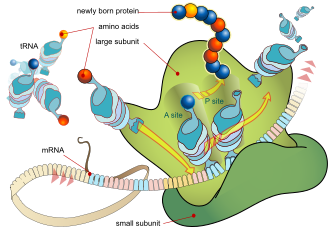Translation (biology)
Translation (Biology)[edit]

Translation is the process by which a cell converts the genetic information encoded in messenger RNA (mRNA) into a sequence of amino acids, ultimately producing a protein. This process is a key part of gene expression and occurs in the cytoplasm of both prokaryotic and eukaryotic cells.
Process of Translation[edit]
Translation involves several key steps: initiation, elongation, and termination.
Initiation[edit]

The initiation phase begins when the small subunit of the ribosome binds to the mRNA. In prokaryotes, this binding occurs at the Shine-Dalgarno sequence, while in eukaryotes, it occurs at the 5' cap structure. The initiator transfer RNA (tRNA) carrying the first amino acid, usually methionine, binds to the start codon on the mRNA. The large ribosomal subunit then joins to form a complete ribosome, ready to begin protein synthesis.
Elongation[edit]
During elongation, the ribosome travels along the mRNA, reading its sequence in sets of three nucleotides called codons. Each codon specifies a particular amino acid, which is brought to the ribosome by a corresponding tRNA. The ribosome facilitates the formation of peptide bonds between the amino acids, extending the growing polypeptide chain.
Termination[edit]
Translation ends when the ribosome encounters a stop codon on the mRNA. Stop codons do not code for an amino acid but instead signal the release of the newly synthesized polypeptide chain. Release factors help disassemble the ribosome and free the completed protein.
Components Involved in Translation[edit]

Several key components are involved in the translation process:
- mRNA: Carries the genetic code from DNA to the ribosome.
- Ribosome: The molecular machine that facilitates the translation of mRNA into protein.
- tRNA: Transfers specific amino acids to the ribosome, matching the mRNA codon with the appropriate amino acid.
- Amino acids: The building blocks of proteins.
Regulation of Translation[edit]
Translation is tightly regulated to ensure proteins are synthesized at the right time and in the correct amounts. Regulation can occur at various stages, including mRNA stability, initiation factor availability, and ribosome activity.
Related Pages[edit]
References[edit]
- Alberts, B., Johnson, A., Lewis, J., Raff, M., Roberts, K., & Walter, P. (2002). Molecular Biology of the Cell. 4th edition. New York: Garland Science.
- Lodish, H., Berk, A., Zipursky, S. L., Matsudaira, P., Baltimore, D., & Darnell, J. (2000). Molecular Cell Biology. 4th edition. New York: W. H. Freeman.
-
Protein synthesis
-
Ribosome mRNA translation
-
Translation - Initiation & Elongation
-
Translation drawing by Carina Huerta
-
Protein translation
-
Model M0 of protein synthesis
-
Model M1 of protein synthesis
Ad. Transform your life with W8MD's Budget GLP-1 injections from $75


W8MD offers a medical weight loss program to lose weight in Philadelphia. Our physician-supervised medical weight loss provides:
- Weight loss injections in NYC (generic and brand names):
- Zepbound / Mounjaro, Wegovy / Ozempic, Saxenda
- Most insurances accepted or discounted self-pay rates. We will obtain insurance prior authorizations if needed.
- Generic GLP1 weight loss injections from $75 for the starting dose.
- Also offer prescription weight loss medications including Phentermine, Qsymia, Diethylpropion, Contrave etc.
NYC weight loss doctor appointmentsNYC weight loss doctor appointments
Start your NYC weight loss journey today at our NYC medical weight loss and Philadelphia medical weight loss clinics.
- Call 718-946-5500 to lose weight in NYC or for medical weight loss in Philadelphia 215-676-2334.
- Tags:NYC medical weight loss, Philadelphia lose weight Zepbound NYC, Budget GLP1 weight loss injections, Wegovy Philadelphia, Wegovy NYC, Philadelphia medical weight loss, Brookly weight loss and Wegovy NYC
|
WikiMD's Wellness Encyclopedia |
| Let Food Be Thy Medicine Medicine Thy Food - Hippocrates |
Medical Disclaimer: WikiMD is not a substitute for professional medical advice. The information on WikiMD is provided as an information resource only, may be incorrect, outdated or misleading, and is not to be used or relied on for any diagnostic or treatment purposes. Please consult your health care provider before making any healthcare decisions or for guidance about a specific medical condition. WikiMD expressly disclaims responsibility, and shall have no liability, for any damages, loss, injury, or liability whatsoever suffered as a result of your reliance on the information contained in this site. By visiting this site you agree to the foregoing terms and conditions, which may from time to time be changed or supplemented by WikiMD. If you do not agree to the foregoing terms and conditions, you should not enter or use this site. See full disclaimer.
Credits:Most images are courtesy of Wikimedia commons, and templates, categories Wikipedia, licensed under CC BY SA or similar.
Translate this page: - East Asian
中文,
日本,
한국어,
South Asian
हिन्दी,
தமிழ்,
తెలుగు,
Urdu,
ಕನ್ನಡ,
Southeast Asian
Indonesian,
Vietnamese,
Thai,
မြန်မာဘာသာ,
বাংলা
European
español,
Deutsch,
français,
Greek,
português do Brasil,
polski,
română,
русский,
Nederlands,
norsk,
svenska,
suomi,
Italian
Middle Eastern & African
عربى,
Turkish,
Persian,
Hebrew,
Afrikaans,
isiZulu,
Kiswahili,
Other
Bulgarian,
Hungarian,
Czech,
Swedish,
മലയാളം,
मराठी,
ਪੰਜਾਬੀ,
ગુજરાતી,
Portuguese,
Ukrainian




